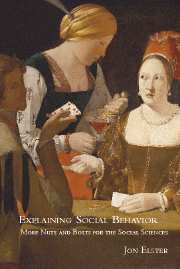Conclusion: Is Social Science Possible?
Summary
What Counts as Science?
The answer to the question whether a social science is possible, or perhaps already exists, depends on the criteria for what is to count as science. An external criterion could be the following: a discipline has become a science when (1) there is general agreement among its practitioners at any point on what is true, what is false, what is conjectural, and what is unknown within its domain; (2) there is a process of cumulative progress by which theories and explanations, when discarded, are discarded forever; (3) the main concepts and theories can be expressed in terms clear and explicit enough to be understood by anyone who is willing to expend time and effort; and (4) the “classics” of the discipline are read mainly by historians of sciences. As Alfred Whitehead said, “A science that hesitates to forget its founders is lost.”
This description is intended to capture roughly the status of the contemporary natural sciences. Criterion (1) is not literally and fully satisfied by any of these disciplines. Controversies exist, for instance, over string theory, punctuated equilibrium, or the relative importance of nature versus nurture in human development. Yet the depth of disagreement is easily exaggerated by those outside the relevant scientific community, who may not appreciate the huge amount of shared agreed-upon knowledge that is the background of controversy and sometimes mistake tentative explorations for definite claims. Criterion (2) is usually satisfied.
- Type
- Chapter
- Information
- Explaining Social BehaviorMore Nuts and Bolts for the Social Sciences, pp. 445 - 468Publisher: Cambridge University PressPrint publication year: 2007



